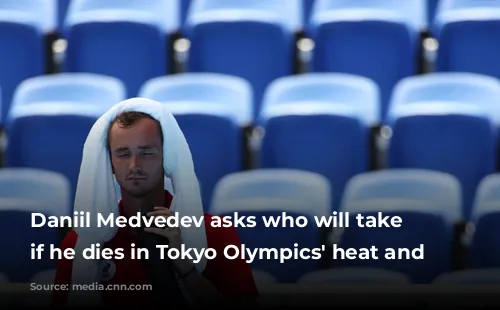The Tokyo 2020 Olympics are facing a new challenge: the intense heat and humidity. While Japan’s summers are traditionally known for their heat, the current conditions are pushing athletes and spectators alike to their limits.
Heat stroke, a dangerous medical condition that can be fatal, has become a major concern. Before the pandemic, it was already considered a significant risk for athletes. But this year, the situation has worsened. During the first week of the Games, the humidity has been abnormally high, ranging from 66 to 84%. This creates the sensation of even higher temperatures, making it difficult for the body to cool down through sweating.
“When you factor in both temperature and humidity, a Tokyo summer is the worst in Olympic history,” says Makoto Yokohari, a professor at the University of Tokyo and advisor to Tokyo 2020.
The consequences of this extreme heat are already being felt. Temperatures have repeatedly reached the high 90s, feeling like triple digits with the humidity. In 2018, Japan experienced a deadly heatwave that claimed over 1,000 lives. This year, over 8,000 people have been hospitalized for potential heatstroke in the week leading up to the Games.

Taking Precautions in the Heat
The International Olympic Committee (IOC) is taking measures to address the heat. They are providing water and shade at competition venues, and have emphasized that the athletes’ well-being is their top priority.
In 2019, organizers made the wise decision to move the marathon to Sapporo, a cooler city, to avoid the sweltering Tokyo weather.
However, athletes in other sports are still struggling.
Russian archer Svetlana Gomboeva suffered from heat exhaustion when temperatures soared above 90 degrees. Russian tennis player Daniil Medvedev, visibly distressed by the heat, described his experience as a fight for survival.
“I’m a fighter, I will finish the match, but I can die,” Medvedev said during his match. He explained that he couldn’t breathe properly and believed it was the most humid day of the tournament.
Spain’s Paula Badosa was forced to retire from her match due to heat stroke and had to be escorted off the court in a wheelchair.
“It’s a shame to end my participation this way,” Badosa said. “The conditions have been challenging from the start, we tried to adapt, but today my body couldn’t handle it.”
Fellow tennis star Novak Djokovic described the conditions as “brutal,” saying he’d never experienced such intense heat on a daily basis in his 20-year professional career.
The International Tennis Federation has implemented an emergency weather policy, providing athletes with two 10-minute breaks when temperatures reach dangerous levels.
The Dangers of Heatstroke
Natsue Koikawa, a former professional runner and current professor and track coach, knows the dangers of competing in extreme heat firsthand. In 1995, she passed out during a marathon and almost died from heat stroke.
“Heat stroke can happen to anyone and it’s a very common cause of death,” she warns.
Koikawa spent over a year and a half recovering and never returned to a major marathon. Now, she researches the dangers of heatstroke in athletes, a risk she believes athletes often underestimate.
“It can be incredibly difficult for athletes to stop competing in the middle of a game, especially when they are representing their country on the world stage,” Koikawa explains. “But I tell athletes that having the courage to quit is the best way to prevent heat stroke.”
Climate Change and the Future of the Games
The impact of climate change is undeniable. Temperatures in Japan have risen three times faster than the global average since 1900.
In 1964, the Tokyo Olympics were held in October to avoid the summer heat. However, in recent decades, the Games have been held in July or August to align with the quieter sporting calendar and maximize viewership, making it a lucrative event for broadcasters.
Yokohari believes that the Tokyo 2020 Games should have been postponed until the fall.
“Holding the Olympics in the middle of summer in Tokyo is a mistake,” Yokohari asserts.
Researchers are warning that by 2085, most cities may become too hot to host the summer Olympics due to the escalating effects of climate change.
While there are no immediate heat advisories for Tokyo, the forecast for the next week predicts temperatures in the low 80s, potentially reaching the high 80s over the weekend.
The Tokyo 2020 Olympics are facing an unprecedented challenge. The heat is not just a nuisance; it is a real and present danger. It is a stark reminder of the impact of climate change and its potential to disrupt even the grandest of sporting events.

